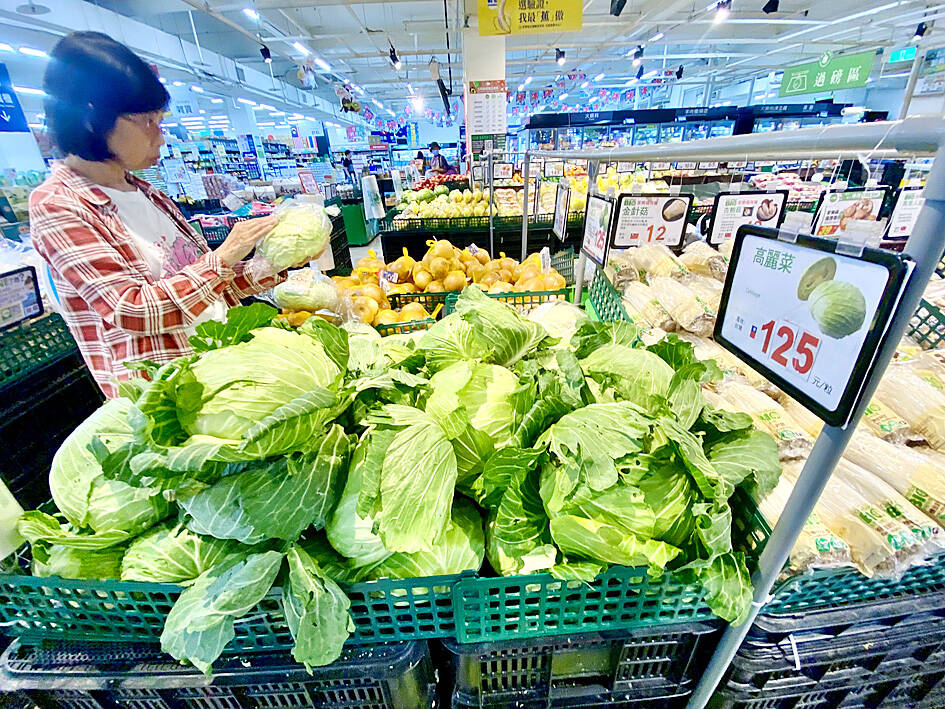The consumer price index (CPI) last month advanced 2.52 percent from a year earlier, as summer vacations boosted entertainment costs, while bad weather pushed up food prices, the Directorate-General of Budget, Accounting and Statistics (DGBAS) said yesterday.
The inflationary measure rose above the central bank’s 2 percent target after two months of easing, raising the shadow of monetary tightening ahead of the body’s policy meeting on Sept. 21.
DGBAS official Tsao Chih-hung (曹志弘) said that the CPI’s resurgence was due to sustained strong demand for entertainment and leisure, while two typhoons disrupted the vegetable market, raising prices.

Photo: CNA
“Stripping away the weather factor, the CPI would have risen just 1.88 percent as it had in July,” Tsao said, calling the inflationary pressures weather-driven and transient.
CPI readings could hover at similar levels this month, as poor weather lingers, but a high comparison base last year would help, he said.
The central bank in June kept interest rates unchanged, but indicated that it would tighten it again if necessary. Most researchers have said that interest rates would stay put for the rest of this year given Taiwan’s moderate inflation and economic slowdown.
The core CPI — a more reliable long-term price tracker because it excludes volatile energy, fruit and vegetable costs — grew 2.56 percent, the slowest in five months and might mitigate as summer vacations come to an end, Tsao said.
The inflationary measure after seasonal adjustments rose 0.18 percent, affirming stable consumer prices, the agency said.
Entertainment and education prices were the main inflation drivers, with a 3.62 percent gain from a year earlier, its latest report found, adding that recreational charges increased 9.11 percent.
Food costs, the largest CPI component, rose 3.46 percent year-on-year after Typhoon Doksuri and Tropical Storm Khanun damaged crops in late July and early last month, Tsao said.
Prices for miscellaneous items rose 2.53 percent, as domestic helpers, jewelry and personal accessories, as well as cosmetic and beauty products grew more expensive, the report showed.
Health and medicine prices increased 2.34 percent, while shelter costs rose 1.77 percent, it said.
Transportation and communication costs rose 1.68 percent, as international oil prices increased 4.32 percent, but local public transportation passes helped lower prices, Tsao said.
The producer price index (PPI), which measures price changes from a seller’s perspective, declined 0.06 percent due to price changes among energy, mineral, metal and chemical products, the DGBAS said.
In the first eight months, the CPI expanded 2.29 percent, while the PPI contracted 0.68 percent, the agency said.

The CIA has a message for Chinese government officials worried about their place in Chinese President Xi Jinping’s (習近平) government: Come work with us. The agency released two Mandarin-language videos on social media on Thursday inviting disgruntled officials to contact the CIA. The recruitment videos posted on YouTube and X racked up more than 5 million views combined in their first day. The outreach comes as CIA Director John Ratcliffe has vowed to boost the agency’s use of intelligence from human sources and its focus on China, which has recently targeted US officials with its own espionage operations. The videos are “aimed at

STEADFAST FRIEND: The bills encourage increased Taiwan-US engagement and address China’s distortion of UN Resolution 2758 to isolate Taiwan internationally The Presidential Office yesterday thanked the US House of Representatives for unanimously passing two Taiwan-related bills highlighting its solid support for Taiwan’s democracy and global participation, and for deepening bilateral relations. One of the bills, the Taiwan Assurance Implementation Act, requires the US Department of State to periodically review its guidelines for engagement with Taiwan, and report to the US Congress on the guidelines and plans to lift self-imposed limitations on US-Taiwan engagement. The other bill is the Taiwan International Solidarity Act, which clarifies that UN Resolution 2758 does not address the issue of the representation of Taiwan or its people in

US Indo-Pacific Commander Admiral Samuel Paparo on Friday expressed concern over the rate at which China is diversifying its military exercises, the Financial Times (FT) reported on Saturday. “The rates of change on the depth and breadth of their exercises is the one non-linear effect that I’ve seen in the last year that wakes me up at night or keeps me up at night,” Paparo was quoted by FT as saying while attending the annual Sedona Forum at the McCain Institute in Arizona. Paparo also expressed concern over the speed with which China was expanding its military. While the US

SHIFT: Taiwan’s better-than-expected first-quarter GDP and signs of weakness in the US have driven global capital back to emerging markets, the central bank head said The central bank yesterday blamed market speculation for the steep rise in the local currency, and urged exporters and financial institutions to stay calm and stop panic sell-offs to avoid hurting their own profitability. The nation’s top monetary policymaker said that it would step in, if necessary, to maintain order and stability in the foreign exchange market. The remarks came as the NT dollar yesterday closed up NT$0.919 to NT$30.145 against the US dollar in Taipei trading, after rising as high as NT$29.59 in intraday trading. The local currency has surged 5.85 percent against the greenback over the past two sessions, central